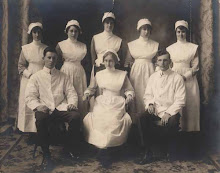

In my last post I mentioned I would talk about the nutrients you need and how a poor diet can affect the body.
Nutrients You Need: Carbohydrates, Proteins and Fat
Carbohydrates should supply half of the day's energy. Their are two forms of carbohydrates Complex carbohydrates and Simple sugars. Complex carbohydrates come from whole-grain breads, cereals, pasta, rice, legumes(dried beans, peas, lentils),fruits and vegetables. Simple sugars come from sugar, honey, syrup, jam or jelly , candies soft drinks pastries,and the natural sugars in milk and fruit or fruit juices.
Simple sugar can pose a problem for those with IBD. Too much simple sugar can cause (or increase) diarrhea. That's because simple sugars cause more fluid to be drawn into the intestine, so food passes through quickly. Diarrhea can be somewhat controlled by limiting the consumption of concentrated sweets and desserts, soft drinks and undiluted fruit juices and dried fruits or high-sugar fruits such as grapes, pineapple and watermelon.
Proteins build and repair every cell in the body, and are especially important to growing children and to people who are ill or recovering from surgery. Proteins help wounds heal faster, repair the lining of the digestive tract, and help the tract product the enzymes that digest food and absorb nutrients. Foods that supply proteins include, meat, poultry, fish, eggs, milk legumes(dried beans, peas, lentils) and tofu.
Fat, the most concentrated source of energy, insulates the body and protects vital organs. Fish( in particular, cold-water fish, such as tuna, salmon, bluefish, mackerel and shellfish),is high in both fat and protein, and is easy to digest. Fats can be obtain in butter, margarine, vegetable oils, dairy, sauces and baked and fried food. Fat can be problematic for some people and should be monitored. More on fats in future posts.
Note: People with IBD are prone to losing protein from severe diarrhea. Signs and symptoms of protein deficiency include fatigue,brittle nails and dull, dry hair.
How a Poor Diet Affects the Body
There are many things that can happen to the body when it is deprived of appropriate nutritional intact...below is a list of things that could happened and how it could be caused by the lack of nutrients.....
- Anemia - can be caused by lack of Iron, Vitamin B12 or folic acid
- Bleeding & bruising - Vitamin K
- Bloating, diarrhea, gas - Maldigestion of carbohydrates and fat
- Bone fractures and pain - Protein, Vit. D, Calcium deficiency
- Delayed growth - lack of calories, malabsorbed proteins, fats or carbohydrate
- Lip and mouth sores - Iron, or B-Vitamin deficiency
- Muscle spasms - Electrolytes deficiency or imbalance
- Muscle wasting - Decrease caloric intact and malabsorption of proteins, fats, and carbohydrates.
In my next post I would like to talk about Fibre in the Diet, Medications and it's affect on nutrition and some of the common problems.
I hope you find this post informative and helpful...and if you know someone who might benefit from this post..please pass it along.
Good Health to you all!!



No comments:
Post a Comment